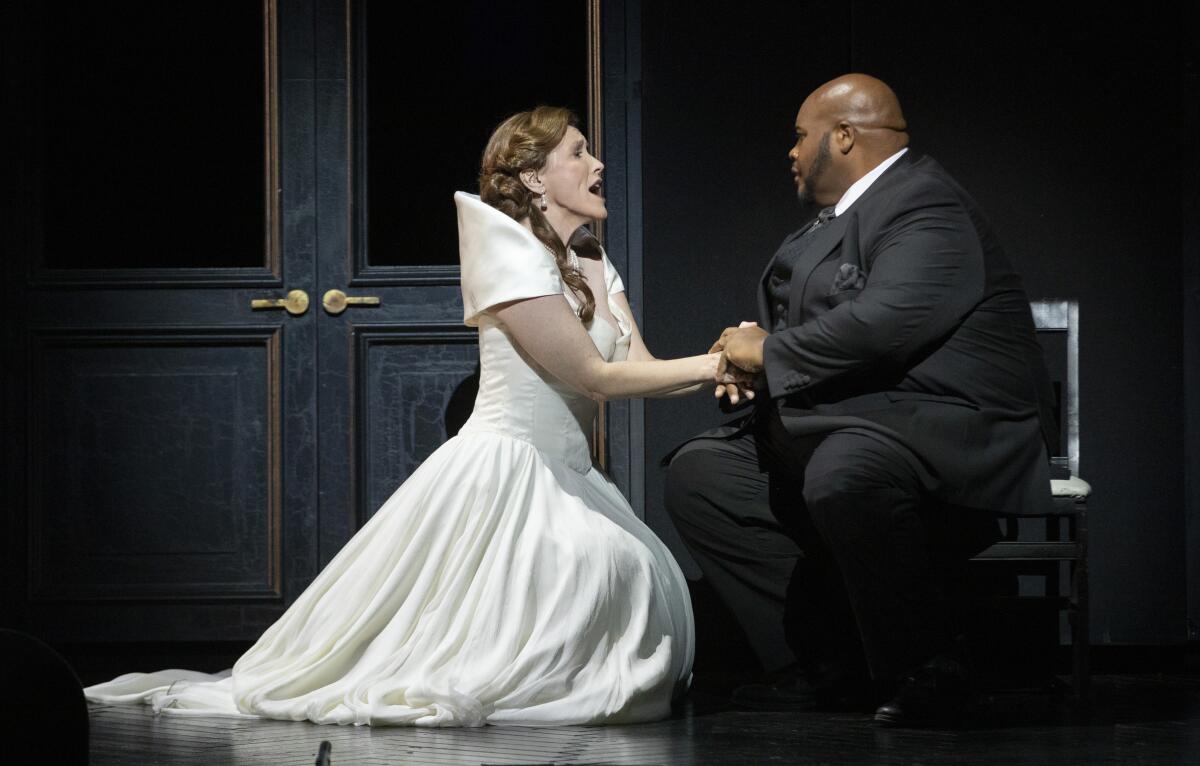L.A. Opera is back big time with ‘Tannhäuser’

- Share via
The long wait for Wagner has ended. After eight years, the flabbergasting master, monster and magician of Bayreuth is back at the Dorothy Chandler Pavilion.
The occasion is the return of the 2008 Los Angeles Opera production of “Tannhäuser.” Wagner’s themes don’t go away. In this, the second of his 10 mature operas, and one the obsessive composer never stopped revisiting, he poses problems he knew very well and that we confront regularly. Is there redemption for someone who cannot control sexual urges?
Tannhäuser snubs uptight social mores of the medieval troubadours and ventures off to the mystical libido-liberating realm of the goddess Venus, who lords over an eternal love-in. Rather than be true to himself, Tannhäuser finds the culture, and insatiable Venus, interminable. Coming back to a stubbornly unchanging society, however, is not so easy.
Coming back to this 2008 Ian Judge production is not so easy either. It was, to begin with, a compromise. Rather than create something from the ground up, the company cost-cut by obtaining an abstract, boxy, bland set from a Salzburg Festival production of a Mozart opera. To liven things up, Judge created a “Wagner pornucopia,” to quote the headline for The Times review.
The over-the-top opening scene in Venusberg was a crude cornucopia of nudity and sex in an attempt to be shocking that proved more ludicrous than lascivious. A louche Tannhäuser sported a pompadour. Thankfully, a more-considered seriousness overtakes later scenes as Tannhäuser returns to the court and woos his former love Elisabeth in a song competition but then can’t control himself within the court’s moral confines.
A penitent outcast, he goes to Rome seeking forgiveness from the pope and is refused it. It takes true and pure Elisabeth dying of heartbreak and Tannhäuser’s own death to achieve divine retribution.
L.A. Opera has reconsidered the production and scaled it down further. The original production has been turned over to a new director, Louisa Muller. There are some new costumes, new choreography and new lighting. Retained are the sets, which look worse than ever, and James Conlon’s conducting, which is better than ever. I attended the second performance Sunday afternoon of the run, which continues through Nov. 6.
Venusberg has hit the skids. It now resembles a small-town bordello and Venus its madame. Tannhäuser, no longer louche but styled with a shaved head and dressed in baggy black, comes across as a sad sack hanging out at the piano. (For some reason, Judge called for a piano and, for some reason, it’s been retained.) Dancers dutifully slink. There is no chemistry between Issachah Savage’s seemingly tame Tannhäuser and Yulia Matochkina’s maternal Venus.
Conlon didn’t appear able to help. The orchestra sounded underserved buried in its pit, and the conductor wasn’t concerned with whipping up momentary excitement, which he can capably do in Wagner. Instead he created a comfortably luxuriant symphonic mattress for the singers who had no use for a real mattress.
But within seconds of the second act, the opera came to life, proving, perhaps, that there is redemption in at least some things.
Coronavirus may have silenced our symphony halls, taking away the essential communal experience of the concert as we know it, but The Times invites you to join us on a different kind of shared journey: a new series on listening.
That was the doing of Sara Jakubiak. The young soprano from Michigan, who has been garnering attention in Europe and is making her L.A. Opera debut, came on stage all gangbusters, which the sheltered Elisabeth probably shouldn’t. Dressed in high-style vintage white, she sang her joyous greeting to the hall where the song competition was to be held as if she were a teenager at her first prom or Taylor Swift concert.
She may have over-emphasized every line and showed off every emotion, but in so doing she displayed a real Wagner voice, with a vibrancy that should take her far. In her presence, Savage came to life as well, and there was more erotic frisson between these two than there had been between Tannhäuser and Venus.
The orchestra too came to life. The chorus was splendid. This act was closer to what it had been the first time around, a setting that looked like a formal European ball in the 1930s, not particularly imaginative but not objectionable.
In the last act, Wagner removes all the frippery, with just three characters and their own personal stories. Wolfram, who also loves Elisabeth, sings his ode to the evening star, and Lucas Meachem made it glow. Elisabeth, true to her love to the end, has her revelation to which Jakubiak brought decided Wagnerian intensity and meaning, this time with emotions worth showing off.
Savage too came to his own. He is a strong but not heroic tenor. His projection is clear and focused. He has stamina. But he needs to be drawn out. Venus did not draw him out. Elisabeth did some, especially when he sexually attacks her at the end of the singing competition (for which she defends him against the angry crowd). Narrating his harrowing trip to Rome and rejection by the pope drew out a broiling, deep-seated anger. By this point he had become a gripping, convincing Tannhäuser.
Conlon conducted with patience, turning on the heat only when absolutely necessary. He allowed the orchestra to almost imperceptibly grow in prominence in the last act so that the big chorus of heavenly redemption at the end could be the most magnificent climax of the evening, coming down big time on the side of redemption.
A redeeming last act in an opera of redemption was also the saving grace of the first “Tannhäuser,” but not nearly on this level. Contributing to the hard-won magnificence was, at one extreme, Morris Robinson’s imperial Landgrave Hermann, who is Elisabeth’s uncle and the hall’s big cheese. At the other extreme was Erica Petrocelli’s sweet-toned shepherd. The various troubadours eager to get a song in were well placed.
All this magnificence does comes at a price. L.A. Opera takes its mask mandate seriously and clearly knows there is a problem. Flyers on each seat beseech the audience to keep masks on for the health of all and the company too.
Yet there was the woman, mask off, eating and talking loudly behind me as I took my seat. A couple nearby, same thing. In the row in front, three had their masks below their noses. Bandanas for masks appear a fashion statement with the opera crowd.
The Music Center follows L.A. County guidelines, which means vaccinations or nervous-making proof of a negative test within 72 hours. Children under 12 are permitted if parents meet nervous-making guidelines. The Los Angeles Philharmonic and Master Chorale have boldly defied those Music Center guidelines and require full vaccination, period, to get in the door at Walt Disney Concert Hall.
Even though L.A. Opera offers the option of purchasing a ticket for streamed performances, it is time that the company follow the L.A. Phil’s lead. Let the risk be in the staging, not the air.
‘Tannhäuser’
Where: Dorothy Chandler Pavilion, 135 S. Grand Ave., L.A.
When: 7:30 p.m. Oct. 27 (also livestreamed) and Nov. 3 and 6; 2 p.m. Oct. 31
Tickets: $19-$292 to see in person, $30 to stream
Info: (213) 972-8001 or laopera.org
Running time: 4 hours, 10 minutes
More to Read
The biggest entertainment stories
Get our big stories about Hollywood, film, television, music, arts, culture and more right in your inbox as soon as they publish.
You may occasionally receive promotional content from the Los Angeles Times.












